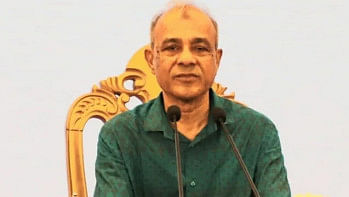Charlie Chaplin and Anjan Das in Bagerhat
A film festival in a city like Dhaka is not a big deal for its dwellers, be it Boishakh, or Falgun or any other month. But when such a festival finds its way to a small town like Bagerhat--however small the monetary resources and funding for advertising and mass gathering!--it is quite an event, a breakthrough in the context of a small town. Especially when one considers that even Khulna, the divisional city, has no such venture. To fully understand the impact of the film society, one has to take into account the context. Bagerhat's filmgoers, much like other parts of the country, gradually shifted over to commercially-oriented Hindi films on the back of the gradual degradation of our national movie industry over the past two decades. It was during this critical time, in 2002, that Bagerhat Film Society, the brainchild of Abdullah Boni, was formed.With the slogan 'Better film, better society', a committee was formed on August 30 with S. Zakir Hossain as president, Abdullah Boni as secretary, and Mahmud Rahman as chief organizer. It has arranged five successful festivals so far, all held at the auditorium of Bagerhat Cultural Foundation located in the center of the town. June 2003 saw the first festival where Bagerhat's inhabitants were given a chance to view movies that till now were seen perhaps by only Dhakaites: Charlie Chaplin's 'The Kid' and the Polish Oscar-winner 'No Man's Land' as well as Bangla classics like Satyajit Roy's 'Gopi Gyne Bagha Byne'. However, as expected, turnout of an audience addicted to Hindi movies was poor.
The following year witnessed a change, when, films like 'The Colour of Paradise' (Iran), 'Life is Beautiful' (Italy), and 'The Flag' (Indonesia) were highly appreciated by the audience, clearly implying that the film society was gaining ground. The third year surpassed the previous shows both in number and variety. This time the audience-response was also very high. A total of 25 movies were screened that included the Bangla movie 'Iti Shrikanta' directed by Anjan Das--who hails from Bagerhat and is now based in West Bengal. The audience also liked 'Children of Heaven' (Iran), the Italian classic 'Bicycle Thief' and the American documentary 'Farenheit 9/11' on Bush's so-called 'war on terror'. Movies from not-much-heard-of Asian and African countries were also highly applauded: 'Osama' (Afganistan), 'Laz' (Assam) and 'Jail Girl' (Morocco). For the 2006 festival, for the first time, the audience wanted more Iranian and Hindi movies. But the small auditorium overflowed when movies from the Middle East, Latin America and India were presented. 'Rang De Basanti' , 'Ahlam' (an Australian-Iraqi co-production), 'Baran' (Iran) and 'Motorcycle Diaries' based on Che Guevara's trip through Latin America were hits.
The fifth festival held in February 2007 focused on Bangladeshi films, in order to give us a chance to historically trace the development of our movies. Contrary to our expectation, it only featured movies that matched the modern-day projector in DVD format--a total of 19 Bangladeshi movies. Surprising everyone who predicted a drop in viewers' response, the auditorium erupted when 'Emiler Goyenda Bahini' and 'Wrong Number' were shown. There was also considerable enthusiasm for the so-called alternative films: 'Matir Moyna', 'Neerantor', 'Joyjatra', 'Nandita Noroke', 'Duratto', etc. The off-beat picks like 'Bachelor', 'Made in Bangladesh' also met with unexpected success.
A year has since passed by without a film feast, except for a two-day-long program devoted to re-screening two Irani films so that the viewers, as the organizers put it, do not lose taste for good films. Later it came out during a talk with S Zakir Hossain that the usual yearly event has been postponed until a later date due to unavoidable political changes. Still one has to wonder if there has really been a change, if moviegoers in a small town have truly developed a more sophisticated taste over the years.
Indeed, there is more to it.
In an informal talk at our favourite adda place, the Salam de Café, with S Zakir Hossain, Abdullah Boni and Mahmud Rahman, (the current secretary) I was told that at the beginning it was hard attracting viewers. But soon things began to change. The Bangladeshi Film Festival, they went on, helped them understand the real situation. While the viewers like to see movies from other countries, they are far more interested in Bangla movies since not very many viewers can keep pace with subtitles on-screen. Asked about the unbelievable response to movies like 'Bicycle Thief', 'No Man's Land', 'Baran' and 'Motorcycle Diaries', they said that it was the subject-matter combined with the cinematic techniques that overcame the language barrier. Side by side with these extraordinary foreign productions, they concluded, we need more quality Bangla movies.
Here I would like to comment on an observation from a piece by Rashid Askari published in this literature page not long ago, "Increasing public interest in audio-visual media has given rise to serious misunderstandings about the consequence on our poor literature. The existence of Bibhutibhushan's 'Pather Panchali' or Tagore's 'Ghare Baire' owes more to the celluloid versions of Satyajit Ray than the old printed texts which are only gathering dust on the library shelves. These classic books are reportedly reaching wider audience by turning into films." While his anger at the commercialized representation of classic Bangla novels is quite justified, the last sentence offers us the stark reality of a historical change that has seen the electronic media as the absolute means to reach a wider audience. There is no denying that movies reach and affect us more immediately and readily than other mass art-forms. Keeping this in mind, Bagerhat Film Society is determined to move on not with commercial enterprises, but to shake up numbed viewers gorging on cheap TV serials and films. The society presently looks forward to arranging regular publications and seminars on different aspects of movies.

 For all latest news, follow The Daily Star's Google News channel.
For all latest news, follow The Daily Star's Google News channel. 



Comments